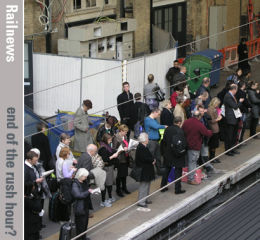Posted 20th April 2020 | 4 Comments
Rush hours could be on their way out

THE traditional morning and evening peaks on the railways might never be restored in full, it is being claimed.
Transport secretary Grant Shapps has predicted that ‘the world will probably not go back to how it was before in a whole manner of different ways’. He told the BBC that business would start to ask: ‘Actually why does everyone have to get up and travel during the rush hour at a particular time in the morning? Why don’t we have more distance through the day?’
Mr Shapps said staggered working hours were also to be expected, which would mean more people travelling in what is now described as the ‘off peak’ period.
Network Rail chairman Sir Peter Hendy is reported to be suggesting that the numbers of commuters allowed on ‘rush hour’ services could in any case be capped, because social distancing may remain necessary for a long time to come. He is also said to be predicting compulsory reservations on intercity trains, so that every passenger has a seat. Easyjet chief executive Johan Lundgren has already revealed that even when flights restart his airline could keep the centre seats in rows of three vacant, in a bid to maintain social distancing.
The predictions from Mr Shapps and Sir Peter have followed a suggestion by chief scientific officer Sir Patrick Vallance that working from home is likely to be encouraged for some time, even after the full lockdown has been relaxed. He told a Downing Street press conference: ‘There may be a number of measures that need to continue … whilst vaccines and therapeutics come along.
‘There will be some changes I think that need to take place … around things like home working, that are going to be important to maintain that ability to break transmission.’
All travel was deliberately suppressed almost a month ago, and passenger numbers on National Rail have now fallen to about 5 per cent of their previous levels. Although rail services have been maintained for key workers and other essential travellers the number of passenger trains has been sharply reduced, although rail freight traffic has increased.
Reader Comments:
Views expressed in submitted comments are that of the author, and not necessarily shared by Railnews.

Gareth Marston, Newtown (Powys)
So how do people get between Crewe and Wigan - a short hop without pre booking? Or Birmingham New St to Birmingham International/Coventry where the InterCity trains are needed for capacity. I'm sure others can think of plenty more examples where Long Distance Trains also do short distance stuff as well. The suggestion is clearly from someone who doesn't know how trains operate in the real world.
Martin Marrison, Haywards Heath
So very interesting, People don't get on overcrowded trains because they want to its because they have too.... Does this mean the train companies will have to provide more capacity so that people will socially distance more? Surely this will mean that running the railways will be less profitable? Or will see less passengers traveling due to the realization that a lot of people can work from home and employers deem it more acceptable? It could be a rough time a head for the train companies......
Jez Milton, Manchester
I too would fight to save the the 'walk up and go' railway. However, if flexible (non-train specific) tickets remain on sale, and reservations can be made up to say, 10 mins before departure, there wouldn't be that much lost. This is how HS2 will operate, I think.
On the other hand, has Hendy thought this through? What would happen on chronically overcrowded routes; e.g. x-country, and even more impractically, what would happen after a period of severe disruption (e.g a fatality). Is he seriously expecting passengers to wait several more hours for a seat, rather than being allowed to stand?!
bob ajobb, nowhereshire
[Comment deleted by moderator as originating email address is false.]